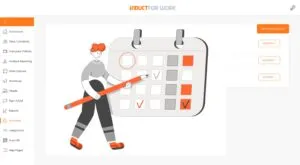Onboarding
I’ve heard of inductions and onboarding. What is the difference?
Induction is just a small part of onboarding. Generally, the induction of a new employee lasts a few hours, days or weeks. It’s about ensuring employees have enough knowledge (and usually quite a preliminary knowledge) of your organisation and safety practices to get started in their jobs effectively and efficiently, but also quickly. Onboarding, on the other hand, is about their long-term induction and may last months. While induction, generally, is about introducing new employees to a company and their new role, as well as learning relevant processes, onboarding is about everything else.
Onboarding is more about an employee’s development and integration into their new role over a long period, so they have a thorough understanding of their new role and the organisation it sits within, but also so they truly do integrate into the company. It includes everything from training them in the culture of a company and ensuring they’re aware of and act in line with the company’s values, to ‘socialising’ them within your organisation in a manner that helps them to truly adjust and feel comfortable. Studies show that new employees who are effectively and adequately onboarded tend to stay longer, perform better and are more satisfied with the organisation. It isn’t just new employees who can partake in onboarding.
Because on-boarding is about a deep and thorough knowledge of a role, one that can only be gained when acting in that role, rather than induction which takes place, largely, before the role commences, onboarding can also be used to induct old employees into new roles. Whether an employee is a new one or an existing one moving to a new role, onboarding is useful for tracking the development of their knowledge. Induction is a one-off event.
On-boarding is everything that happens before and after induction because it’s about ensuring new employees (and those moving into new roles) truly are ‘on board’ with their new employer or their new position.
WHAT IS THE DIFFERENCE BETWEEN INDUCTION AND ONBOARDING?
Induction and onboarding are the fundamental processes of acclimating new employees. They’re very much interrelated as the induction process makes up a small part of the onboarding process. The induction process can generally take a couple hours, days or weeks, but is relatively short. An induction is the initial education process each employee undergoes with the aim of introducing them to the company and their roles. It provides them with the preliminary knowledge on how to begin their jobs. Conversely, onboarding is a longer process which can take months, and works towards the employee’s long-term integration to the company. Whilst induction covers the employee’s introduction process to their job, onboarding makes up for the further acclimation of new employees.
Onboarding focuses on the employee’s long-term development and integration into the company and their roles over a few months. It’s about ensuring the employees are suitable integrated to the company and they have an in-depth comprehension of the job and roles, policies and regulations relative to the organization. It involves the extensive training process regarding the company’s conventions and values ensuring the new employee is aware of, comfortable with and adhere to them. It also involves ‘socialising’ them within your organisation and other employees to ensure mutual adjusting from both sides to simultaneously attain a comfortable and cooperative work environment. It is evident that new employees who are properly and thoroughly onboarded tend to be overall more satisfied with their position and the organiasation. Likewise, employers are more satisfied with their work and integration into the organisation as they tend to stay longer and perform better within their roles.
The on-boarding process shouldn’t be exclusively reserved for new employees directly in succession to induction or online induction. On-boarding is about attainting a thorough and abundant knowledge of a role and its requirements, a knowledge that can only be attained through acting in that role over time as opposed through the induction process. For this, on-boarding can also provide old-employees with in-depth comprehension of new roles and be used in combination with further induction to prepare them for said roles.
Regardless of whether an employee is new to the company or merely learning a new role, on-boarding assists in tracking their progress through monitoring the development of their knowledge. In retrospect, on-boarding is everything which occurs prior to or even before the induction because it’s about making sure new employees, and current employees with new roles, are truly ‘on board’ with their roles, position, employer and the organisation. However, effective onboarding cannot successfully occur without a thorough induction process. This induction process can most efficiently be conducted online as to easily educate your new employees of their roles, whilst tracking and monitoring your employee(s) induction process from the convenient location of your computer.
Induct For Work offers a free 14 day trial no obligation trial to start onboarding process for your staff.
Send us any questions or great tips to share? – Contact us here.
Induct for Work – the only system you need to create and manage online inductions in UK.







